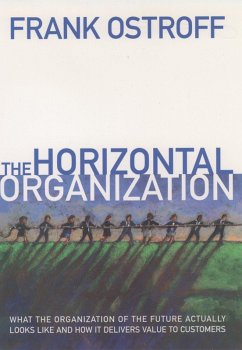
The Horizontal Organization (eBook, ePUB)
What the Organization of the Future Actually Looks Like and How It Delivers Value to Customers
Versandkostenfrei!
Sofort per Download lieferbar
19,95 €
inkl. MwSt.
Weitere Ausgaben:

PAYBACK Punkte
10 °P sammeln!
The vertical/functional hierarchy has been the mainstay of business since the industrial revolution. But it has its problems. In fact, the vertical design all but guarantees fragmented tasks, overspecialization, fiefdoms, turf wars, the urge to control from the top--all the negatives that foster organizational paralysis. In The Horizontal Organization, Frank Ostroff provides executives with the first truly viable alternative to the age-old vertical alignment. Indeed, he offers nothing less than the first full view of what the organization of the future looks like and how it works. The concept ...
The vertical/functional hierarchy has been the mainstay of business since the industrial revolution. But it has its problems. In fact, the vertical design all but guarantees fragmented tasks, overspecialization, fiefdoms, turf wars, the urge to control from the top--all the negatives that foster organizational paralysis. In The Horizontal Organization, Frank Ostroff provides executives with the first truly viable alternative to the age-old vertical alignment. Indeed, he offers nothing less than the first full view of what the organization of the future looks like and how it works. The concept of horizontal organization has been hailed in Fortune as "a model corporation for the next fifty years" and in a Business Week cover story as "the real thing." But until now, management books have offered only piecemeal accounts of what the organization of the future might look like. Ostroff, a key developer of the concept of the horizontal organization, offers the first workable road map. He describes what the horizontal organization is, what it looks like, why it is important, how it helps improve performance, where it is appropriate, and how to develop it. The book contains real case examples that show how major international corporations (and one federal agency) have used Ostroff's concepts to meet their competitive goals. For instance, we see how Ford Motor Company's Customer Service Division turned to the horizontal organization to meet a highly ambitious goal--to get the customer's car fixed right, on time, the first time, at a competitive price, in convenient locations. We see how a horizontal design radically improved the performance of OSHA (the federal agency that oversees occupational safety), transforming it from a bureaucratic enforcer of regulations to a proactive problem-solver in a concerted effort to improve working conditions and save lives. And we see how Xerox combined both vertical and horizontal designs successfully, a case that underscores when a firm can best use the horizontal organization to achieve their goals. Ostroff also looks at a General Electric plant in North Carolina, Motorola's Space and Systems Technology Group, and the home finance division of Barclays Bank, highlighting how these major corporations have also used the horizontal organization to radically improve productivity. Many successful business books, such as Reengineering the Corporation and Beyond Reengineering, have given managers only a piece of the puzzle. Ostroff gives us the complete picture. The Horizontal Organization offers the first usable roadmap to the twenty-first-century firm. It is a book everyone who desires to radically improve the performance of their organization will want to read.
Dieser Download kann aus rechtlichen Gründen nur mit Rechnungsadresse in A, B, BG, CY, CZ, D, DK, EW, E, FIN, F, GR, HR, H, IRL, I, LT, L, LR, M, NL, PL, P, R, S, SLO, SK ausgeliefert werden.













